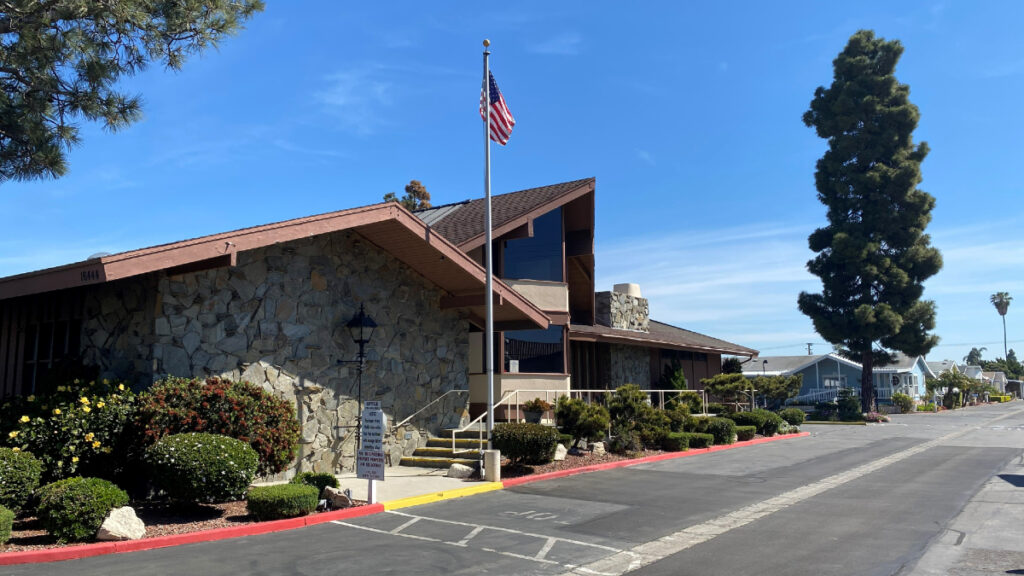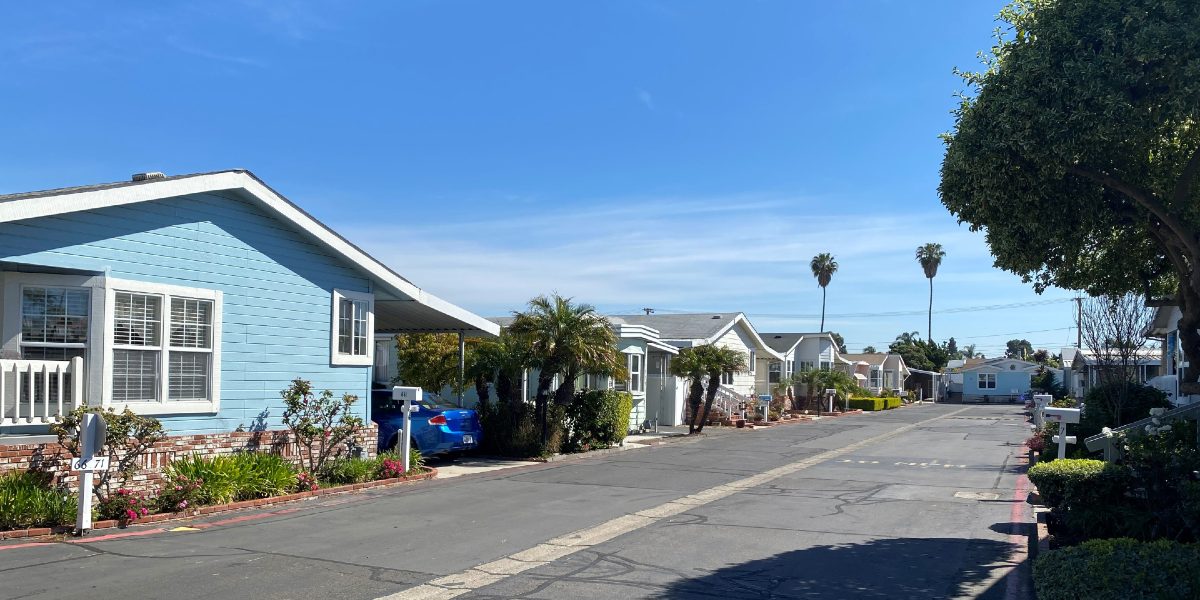A rent increase at Skandia Mobile Country Club in Huntington Beach, stemming costs associated with an ownership change last year, have some Skandia residents demanding rent control, while other residents believe the new owners are doing their best to manage a difficult transition.
The controversy take place against a tableau of surging inflation that is increasing the cost of doing business across the board, and bleeding into housing affordability.
Skandia: Family Operated For Decades
The 167-space Skandia Mobile Country Club was developed in 1964 by Dr. Adrian Hubbell, an oral surgery pioneer who developed the “Hubbell Bubble,” a foot-operated pump to inject anesthesia as necessary while operating.
Designed with a Scandinavian theme with streets named after Norwegian towns, Skandia is restricted to residents who are 55 or older (although adult children, caretakers, etc. who are over 35 may live with them). It is a tidy community of well-kept, mostly newer manufactured homes with late model sedans parked in their driveways and American flags flying from more than a few porches. The large, mid-century club house has a retro vibe, and the pool is large and well maintained.
Skandia is a mile from the beach, with a slew of shops and amenities within easy walking distance.
After Hubbell’s death in 2001, the park was operated under a family trust held by five daughters. In August 2021, it was sold to Investment Property Group (IPG) for nearly $60 million.
Dramatic Property Tax Increase Leads To Rent Increase
California’s landmark Proposition 13 fixes the property tax rate at 1%, and limits annual increases to no more than 2%. Since property is only re-assessed when it is sold, transactions involving property that has been held for decades by the seller results in a dramatic increase in the annual property tax that the buyer must pay.
When the Hubbell Family Trust owned it, Skandia’s property tax was based on its assessed value in 1975. After it was sold to IPG, it was re-assessed based on 2021 real estate values, and the property tax bill skyrocketed. On a per space basis, the property tax surged from $50 to $290 per space.
IPG also invested an additional $100,000 into community improvements such as asphalt and new pool furniture.
Since the costs of operating the park had gone up significantly, a rent increase was unavoidable. At the time of the acquisition, most Skandia residents paid a monthly space rent of $1,128. To put that in context, residents of city-owned Ocean View mobile home park pay the same space rent, but without any amenities.
In November of 2021, IPG announced that effective March 1 of 2022, monthly rent for existing residents would increase by $75, or about 6.6%. The monthly space rent for new residents was raised to $2,195, which is approximately the market rate for the area.
The initial long-term lease – 15, 20 or 25 years – offered to residents contained a $75 per month increase for the next three years, after which annual increases go to 5% or the equivalent of the Consumer Price Index, whichever is greater. In response to resident feedback, IPG is also now offering a 5-year lease with an annual increase limited to the CPI. Or residents can switch to month-to-month.
“Our goal was to keep the increase low in an effort to keep Skandia residents in the park,” said Julie Rodriguez, president of property management for IPG. “The $75 increase for existing residents is below the inflation rate.”
Eligible residents were also encouraged to apply for rent subsidies through the rental assistance program operated by the Manufactured Housing Education Trust. Under the MHET program, qualifying residents receive subsidies equivalent to 10% of their monthly space rent. According to the MHET, more than a dozen Skandia residents have applied; one has been approved and another denied, and the remainder are still in the evaluation process.
Rent Control Issue Divides Park Residents
Nonetheless, the rent increases came as a shock to Skandia residents accustomed to paying below-market rents. A number of , and many of whom are advanced in age and on fixed incomes. And they responded in different ways.
Several followed the lead of Carol Rohr, who had moved into Skandia in 2019. Rohr formed a group she christened the Skandia Homeowners Association. Despite the name, it isn’t an HOA in the ordinary sense: residents are not required to pay dues, and the group has no governing power, maintenance responsibilities or an elected board of directors.
Rohr and other residents claim the space rent increase has lowered the value of their homes as awareness of the rent increase spreads among potential buyers.
Rohr’s has adopted a strategy of mass resistance, demanding a rent control ordinance for mobile home parks and pointing to Santa Ana’s 3% annual cap on rent increases as model.
Critics claim Rohr urged other residents not to sign leases with IPG and to boycott the rental assistance program – a contention Rohr denies.
“The only sure remedy is to take bold action by reining in the abusive behavior of predatory park owners who scoff at the negotiation and delight in trampling the residential property rights of mobile home owners,” Rohr said at a recent city council meeting. “We ask that you amend the city charter by placing a carve out o the measure of the November ballot for the mobile home parks in Section 803.”
Any attempt to impose rent control would run afoul of Section 803 of the Huntington Beach City Charter. In 2002, 68.7% of city voters approved Measure EE, a property rights protection measure that amended the charter to prohibit rent control of any kind.
Rohr’s group wants the council to place on the November ballot a measure that would exempt mobile homes from Measure EE and open the door to the imposition of a rent control ordinance. Organized and vocal, they use public comments at city council meetings to demand councilmembers place a mobile home carve out on the ballot.
Other Skandia residents disagree with Rohr.
Jan Raymond has been a Skandia resident for 18 years, and lives in a 1,800 square feet, with four bedrooms, three bathrooms, vaulted ceilings and skylights. She is active in the community and spearheads a weekly food drive for other Skandia residents.
“It’s one of the nicest locations you can live in,” she says of Skandia. While she understands residents being upset about the recent rent increase, Raymond – who lives on Social Security – doesn’t believe rent control is the answer.
“Anybody who has ever been in business for themselves knows you have to cover rising expenses such as taxes, insurance, employees – as maintaining just your business,” said Raymond. “Some of the people that are having some issues with it don’t understand that if the shoe was on the other foot, they’d be doing the same thing.”
Raymond the rent control ploy as unrealistic and thinks Rohr is on a “power trip,” dividing the community and using misinformation to mislead other residents into acting against their best interest.
“She’s telling people not to sign the lease with the new owner. And that can be very detrimental for them, because when their lease expires they’ll be month-to-month renters,” said Raymond.
“Signing the lease guarantees any rent increase will be capped at $75 a month,” said Raymond, who has signed a 20-year lease.

During public comments at the February 1 Huntington Beach City Council meeting, Vickie Talley, the executive director of the MHET, marveled that Rohr was lobbying Skandia residents who were worried about the rent increase not to apply for rent assistance.
“You can’t help but identify with [Skandia residents]. Nobody likes to see rent increases,” said Talley. “You now the really sad thing? The HOA there [Rohr’s group] is telling people not to apply [for rent subsidies],” noting that the amount of the subsidy actually exceeds the rent increase.
Rent Control and Rising Operating Costs
Chris Houser and his brother own the Rancho Del Rey Mobile Home Estates in Huntington Harbour. His family has operated the 379-space park since 1965. The median monthly space rent is $1465, although half the residents pay more than $1,500.
Houser says rent control demanded by Rohr’s group is inequitable and unfair.
“We are more than happy to assist residents that need help, and we participate in the MHET’s rent subsidy program,” said Houser.
“But I am opposed to singling out mobile home park owners for rent control,” said Houser. “Who is going to put limits on the increases to our expenses, which go up every year: insurance, employment costs, constantly climbing maintenance costs.”
“It would just lead to rundown mobile home parks,” he said.
Mobile Home Living In Huntington Beach Remains Affordable
Ironically, demands for mobile home rent control underscore the reality that mobile home communities, even at a time of surging home prices, rising apartment rents and growing inflation, remain comparatively affordable options.
The mobile home lifestyle occupies a middle ground between being a rent and owning a home. Residents own the manufactured home in which they live – paying a mortgage and taking the mortgage tax deduction – while renting the land on which their home sits.
The combination of space, amenities, community and affordability is very attractive, especially to seniors. Living in an 1,800 square foot manufactured home with three to four bedrooms and updated amenities is often less expensive than renting a two-bedroom apartment.
Last fall, Dave Smith, 68, with his wife and disabled adult son, purchased a 9-year old, 1,500 square foot, three-bedroom, 2 bathroom manufactured home in Skandia. The mortgage and the space rent combined are less than the $3,100 a month he was paying to rent a house. He signed a 25-year lease that caps annual rent increases.
“We’re seniors and we wanted to downsize,” said Smith. “I liked the home, the price was right and the rent was affordable for me. It was a good financial move.”
Gordon Briggs, 83, and his wife Diane, 76, moved into the Rancho Del Rey mobile home community in Huntington Beach 17 years ago.
“I never thought I’d live in a mobile home park,” said Briggs. “But these aren’t just trailers – they’re manufactured homes.”
Impressed by a co-workers home in Rancho Del Rey, he and his wife Diane sold their condo and bought a new, 1,600 square foot, three bedroom, two bathroom manufactured home, and have never regretted it.
“Our grandchildren are always welcome. We can walk to the beach – it’s only half a mile away,” said Diane. “It has been kind of a perfect place.”
Thanya Hansen, another Rancho Del Rey resident, pointed to affordability, a desire to downsize and a quality of life that’s preferable to a dense condominium complex.
“You have many people selling their homes near Huntington Harbour who, for health or other reasons, want to downsize,” said Hansen. “Condominiums mean neighbors above or below you and property taxes, which are kind of expensive.”
“You come into a place like Rancho Del Rey and you have more room and more privacy. You pay space rent but property taxes are low and decline each year,” said Hansen. “You can save or invest the money from the sale of your house, and you’ve got a beautiful home with privacy, in a gated community.”
Another Rancho Del Rey resident, 78-year old Donald Reifman said the park affords him a quality of life in a desirable area that would be impossible outside of a mobile home park. Reifman depends on Social Security and participates in the MHET’s rental assistance program.
Mike Villenueva, a realtor, recently bought a manufactured home in Skandia at the space rent of $2195, and maintains it is still an affordable option.
“You’re in Huntington Beach, a mile from the ocean. Rent on a two-bedroom apartment across the street is $3,000,” said Villenueva. “At Skandia, you’re living in a three or four bedroom manufactured home that you own and on which you get a mortgage deduction, and you’re still paying way less than that two-bedroom apartment.”
Villenueva claims the protests by Rohr’s group are counter-productive, and that rent control would ultimately degrade the value of their homes.
“Park operating costs keep going up. If you cap rent increases and sooner or later park owners will cut back on maintenance, stop investing in improvements, and the park will deteriorate – and the mobile home values with it,” said Villenueva.
“This rent increase comes out to $3 a day to live in a beautiful, well-run community with top-notch amenities that’s a mile from the beach,” said Villenueva. “It’s affordable by any measure.”


